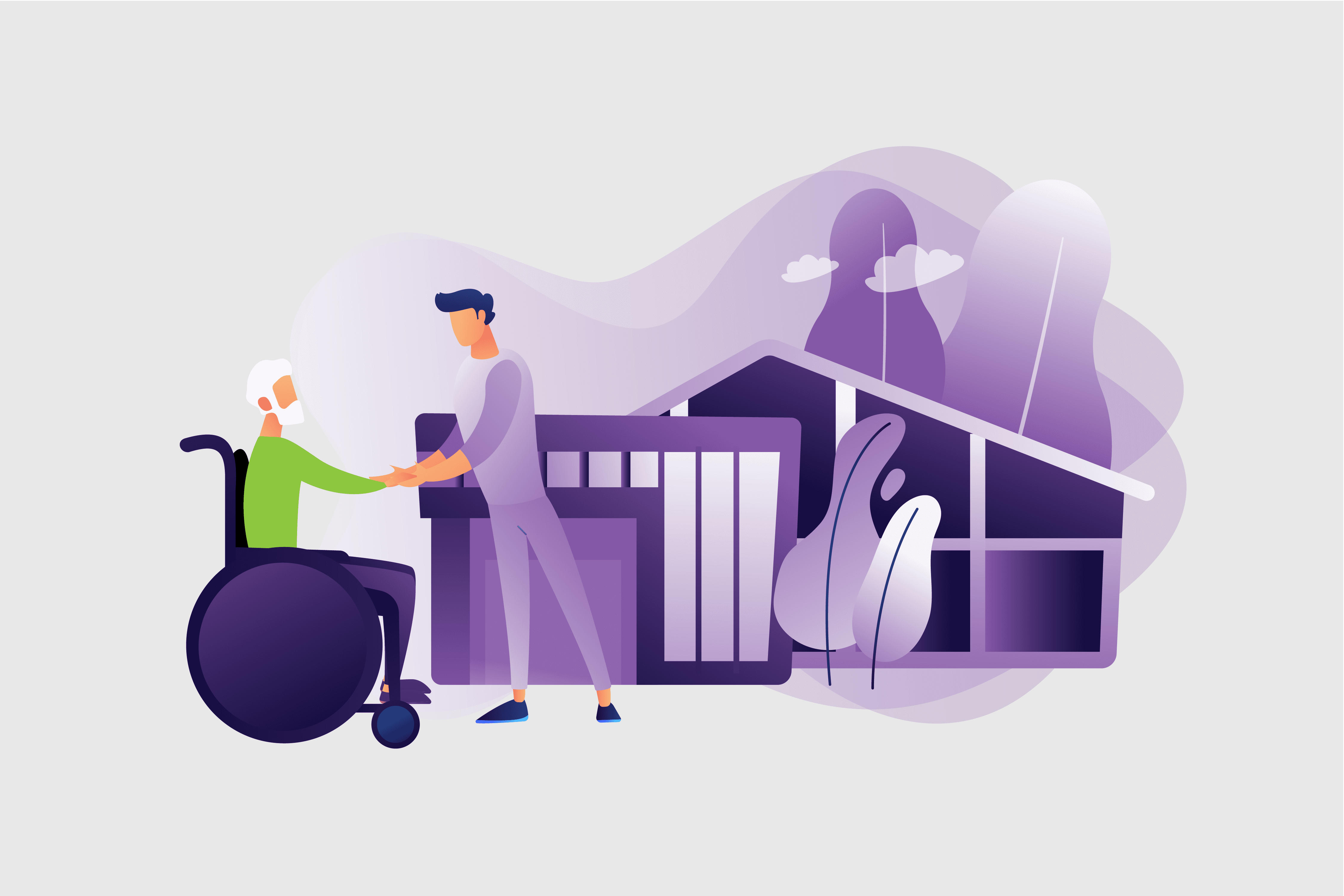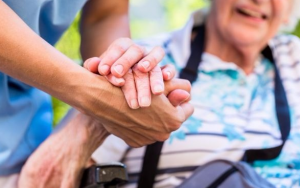Disability Support myths debunked: Common misconceptions clarified
Disability Support myths debunked: Common misconceptions clarified
Blog Article
The Vital Link In Between Handicap Solutions and Effective Home Treatment Solutions
The connection in between handicap solutions and home treatment options is important for enhancing the lives of individuals with disabilities. Disability solutions offer vital resources and support. Home care solutions offer individualized help in acquainted atmospheres. This collaboration advertises self-reliance and social incorporation. Yet, the specifics of how these aspects communicate remain complex. Comprehending this link can reveal brand-new insights into boosting care for those in need. What are the ramifications for caregivers and people alike?
Recognizing Disability Providers: An Introduction
While numerous people might not totally understand the intricacies of impairment solutions, understanding their range and importance is crucial for promoting inclusivity. Handicap services encompass a large range of assistance mechanisms created to aid individuals with physical, intellectual, or developmental handicaps. These solutions objective to improve the top quality of life, promoting independence and involvement in culture. They consist of instructional programs, employment support, transport aid, and healthcare services tailored to individual needs.Furthermore, these services commonly entail collaboration among various stakeholders, including government companies, non-profit organizations, and neighborhood groups. This collective technique warranties that people obtain detailed assistance that resolves their one-of-a-kind obstacles. Awareness of disability solutions is important, as it motivates societal acceptance and the removal of preconception. By identifying the value of these solutions, areas can produce a much more inclusive environment, ultimately profiting every person and advertising equivalent chances for people with handicaps.
The Function of Home Care in Sustaining Individuals With Disabilities
Home treatment plays an essential duty in boosting the lives of individuals with impairments by offering personalized assistance in familiar environments. This kind of treatment allows people to preserve their independence while obtaining help tailored to their specific demands. Caregivers not only supply physical assistance, such as aid with daily tasks like showering and dish preparation, however additionally offer psychological encouragement and companionship.In enhancement to useful assistance, home care solutions assist in social interaction, which is basic for mental health. By involving people in community tasks or promoting communication with family members and friends, caregivers assist combat sensations of isolation. Home treatment also relieves the concern on member of the family, permitting them to focus on their own responsibilities while ensuring their enjoyed ones receive appropriate treatment (Disability Support). Inevitably, home treatment works as a significant support group, empowering people with disabilities to flourish within their very own homes
Tailored Treatment Plans: Meeting Special Demands
Tailored care plans are essential for effectively dealing with the special demands of individuals with impairments. These plans are created to give personalized support, considering the certain obstacles and choices of each individual. By performing thorough assessments, care companies can recognize locations and toughness needing help, making certain that care is both appropriate and effective.Incorporating input from the private and their family participants fosters a collaborative method, enhancing involvement and contentment. Customized care strategies might include different services, such as physical therapy, work therapy, and personal care support, all targeted at promoting overall well-being. Normal analyses of these treatment plans are necessary to adapt to transforming demands and scenarios. This flexibility enables timely adjustments, guaranteeing that individuals obtain excellent assistance throughout their lives. Ultimately, customized treatment plans work as a structure for delivering quality treatment that appreciates the dignity and originality of everyone.
Enhancing Freedom With Impairment Services
Empowering people with handicaps to accomplish better self-reliance is a key goal of special needs services. These solutions provide crucial resources that promote self-sufficiency and boost the lifestyle for those affected. By using personalized support, such as mobility training, adaptive modern technologies, and life skills growth, disability solutions allow people to navigate everyday obstacles more effectively.Access to community-based programs and social inclusion campaigns further promotes freedom. Through these chances, individuals can involve in purposeful tasks, build connections, and create a feeling of belonging. Additionally, info and recommendation solutions aid connect individuals to vital sources, guaranteeing they obtain the assistance needed to thrive.Ultimately, improving self-reliance with handicap solutions not just benefits individuals but also promotes a more inclusive society. By damaging down barriers and encouraging self-advocacy, these services empower people to lead satisfying lives, contributing to their neighborhoods in beneficial means.
The Relevance of Training for Caretakers
Educating for caregivers is vital for developing essential skills that directly influence the top quality of care offered to individuals with disabilities. By improving their knowledge and abilities, caretakers can foster compassionate relationships that advertise count on and understanding. This emphasis on training not just improves solution delivery however also enriches the total caregiving experience.
Essential Skill Growth
Ability advancement is essential for caregivers in the disability services and home treatment sectors. Appropriate training equips caregivers with the basic skills required to supply reliable support and help to people with disabilities. This includes understanding certain clinical demands, effective communication techniques, and the capability to react to different behavior obstacles. Additionally, ability development enhances caretakers' capacity to cultivate independence in clients, assuring they can do day-to-day activities with dignity. Recurring training additionally promotes self-confidence and task complete satisfaction among caregivers, lowering turnover prices in the market. By focusing on skill development, organizations can guarantee that caretakers are well-prepared to meet the varied requirements of those they serve, inevitably adding to an extra thoughtful and reliable treatment environment.
Enhancing Treatment Quality
Boosting the quality of take care of individuals with specials needs depends upon the extensive training offered to caretakers. Trained caregivers have essential expertise and skills needed to address the distinct requirements of their clients properly. Extensive training programs include different facets, such as recognizing disability-specific obstacles, effective communication methods, and safety protocols. Additionally, ongoing education and learning assurances that caregivers continue to be updated on ideal techniques and emerging technologies in home care - Disability Services. This dedication to training not only enhances solution distribution but additionally cultivates a sense of self-confidence among caregivers, which translates into improved treatment top quality. Inevitably, buying caretaker training is vital for producing an atmosphere where individuals with disabilities receive the alert, respectful, and effective treatment they are worthy of
Building Compassionate Relationships

Building an Encouraging Environment in the house

Accessible Home Alterations
Lots of individuals with handicaps deal with considerable obstacles in navigating their home environments, making obtainable home adjustments essential you can check here for cultivating self-reliance and safety and security. These adjustments can include setting up ramps, expanding doorways, and producing barrier-free restrooms, thus allowing less complicated gain access to throughout the home. Furthermore, including grab bars and non-slip surfaces can greatly reduce the danger of falls, promoting an extra protected living room. Stairlifts or lifts may additionally be required for multi-level homes, making certain that all areas are obtainable. By applying these modifications, caretakers can help produce an environment where individuals can browse their rooms with self-confidence. Eventually, accessible home alterations play an important function in boosting the top quality of life for those with disabilities, allowing them to flourish in their own homes.
Personalized Treatment Program
Available home adjustments lay the groundwork for an atmosphere where people with specials needs can thrive, but tailored support is equally important. Personalized care plans play a necessary duty in resolving the one-of-a-kind demands of each person. These strategies are established through extensive evaluations that think about medical requirements, individual choices, and everyday routines. By concentrating on individual strengths and challenges, caretakers can produce techniques that foster independence and boost top quality of life. Routine analyses assure that care plans continue to be appropriate and reliable, permitting modifications as needs transform in time. This individualized approach not just enhances the experience of those obtaining care but additionally advertises a sense of freedom, eventually contributing to an extra helpful and encouraging home setting.
Household Participation Methods
Family participation is important in establishing an encouraging atmosphere for people with specials needs at home. Engaging household members in treatment methods fosters a sense of belonging and security. Efficient communication is essential; regular household conferences can help with conversations about the individual's choices and needs. Furthermore, enlightening relative concerning the particular handicaps can enhance understanding and empathy, bring about better support. Urging engagement in daily tasks not just reinforces partnerships but additionally advertises independence for the individual. It is important for family members to collaborate with special needs provider to produce natural care plans. By proactively involving household participants, a supporting ambience is grown, ultimately improving the lifestyle for those with specials needs.
Gauging the Influence of Integrated Treatment Solutions
The efficiency of incorporated treatment options can substantially affect the quality of life for individuals with disabilities. Gauging this impact needs a diverse technique that includes different metrics, consisting of health outcomes, user complete satisfaction, and cost-effectiveness. Health and wellness results can be evaluated by tracking renovations in flexibility, psychological wellness, and general wellness, offering tangible evidence of care efficiency. User satisfaction studies can catch the experiences of individuals and their families, offering understandings right into the perceived quality of care received. In addition, assessing cost-effectiveness aids to ensure that resources are being made use of successfully, enabling lasting treatment models. By using these dimension techniques, stakeholders can gain a complete understanding of exactly how integrated treatment services favorably impact individuals with impairments. Ultimately, this information not only help in refining existing services yet also informs future plan decisions, ensuring that treatment remains straightened with the developing demands of this populace.
Often Asked Inquiries
Exactly How Can Family Members Advocate for Better Handicap Solutions and Home Treatment?
Families can support for improved special needs services and home care by looking into sources, attending neighborhood meetings, engaging with regional representatives, sharing individual experiences, forming assistance teams, and working together with companies committed to impairment legal rights and care improvements.
What Are Common Misconceptions Regarding Disability Providers and Home Care?

Are There Financial Help Options for Impairment Providers and Home Care?
Monetary aid choices for handicap services and home care consist of government programs, grants, and insurance policy protection. Resources vary by place, calling for individuals to research study neighborhood agencies and organizations that give financial backing customized to their needs.
Exactly How Can Modern Technology Improve Home Look After Individuals With Disabilities?
Innovation can boost home care for individuals with specials needs by providing assistive devices, telehealth services, and checking systems. These developments enhance availability, advertise independence, and make it possible for caregivers to respond better to the needs of their websites clients.
What Resources Are Offered for Caretakers of People With Disabilities?
Numerous sources exist for caretakers of people with handicaps, consisting of entitlement program programs, support system, instructional workshops, on-line discussion forums, and specialized training. These resources intend to enhance caretakers' abilities and provide psychological and sensible assistance. The connection between impairment services and home care solutions is vital for boosting the lives of people with specials needs. Home treatment likewise minimizes the concern on family participants, permitting them to concentrate on their own responsibilities while guaranteeing their enjoyed ones get sufficient care. By conducting thorough analyses, treatment suppliers can determine staminas and areas requiring aid, making certain that care more helpful hints is both effective.incorporating and pertinent input from the specific and their family participants promotes a collaborative strategy, improving engagement and satisfaction. Customized care strategies may consist of different solutions, such as physical therapy, occupational treatment, and personal treatment support, all intended at promoting total well-being. Modern technology can improve home care for people with disabilities by supplying assistive devices, telehealth solutions, and keeping track of systems.
Report this page